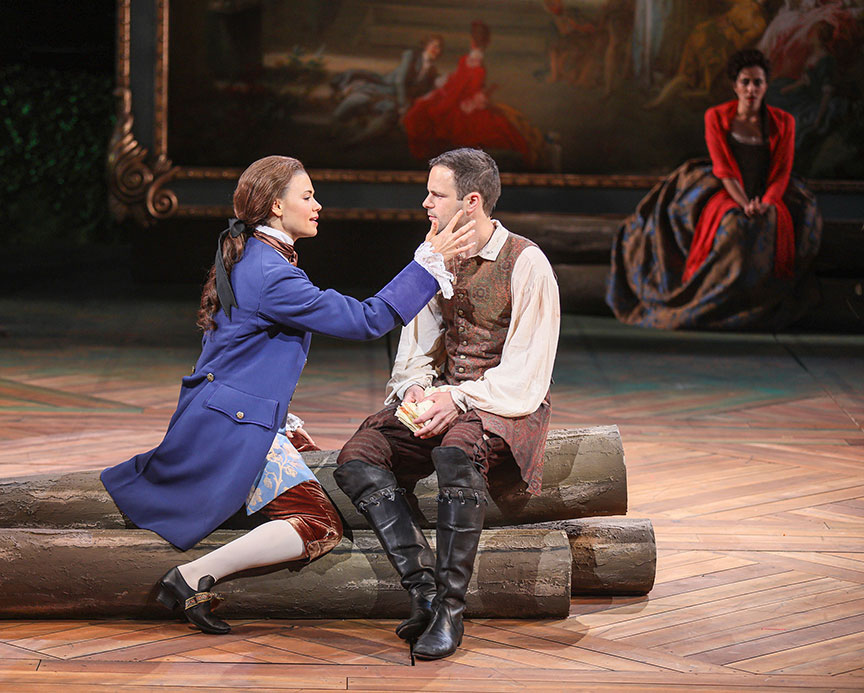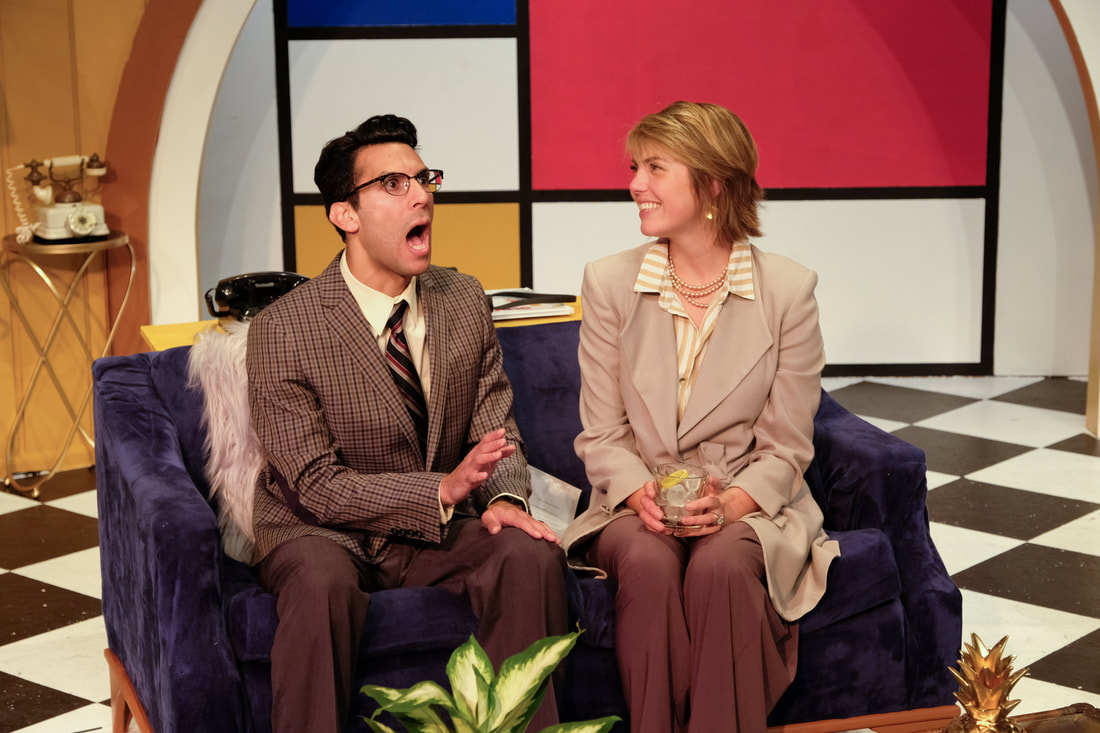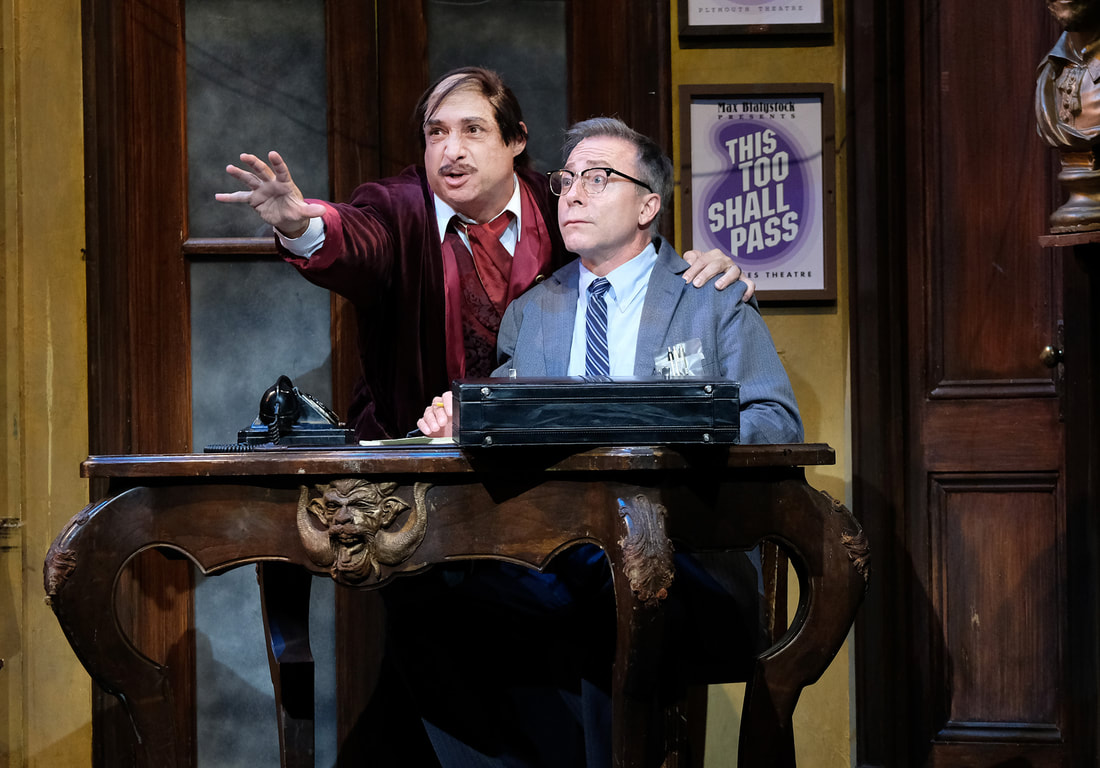|
Meredith Garretson and Jon Orsini in "As You Like It." Photo by Jim Cox Who wouldn’t want to escape to the Forest of Arden brought to life in the Old Globe’s new production of As You Like It? The pastoral setting designed by Tobin Ost is peaceful, even magical. The atmospheric lighting by Stephen Strawbridge is ideal for both the romance and the harmless intrigue of perhaps Shakespeare’s most beloved comedy. There’s original music by Obadiah Eaves that throughout evokes the lighthearted emotional intensities of characters brazen, bold and hopelessly smitten. In short, this is a forest where it’s easy to believe in love at first sight.
As You Like It opens the Old Globe’s 2019 Summer Shakespeare Festival on the outdoor Lowell Davies stage. To direct, the Globe selected Jessica Stone, whose credits for the theater include a charming Barefoot in the Park last year and a cleverly conceived Ken Ludwig’s Robin Hood! the year before, both in the intimate Sheryl and Harvey White space. This is Stone’s first time directing Shakespeare and she has just the right touch. This As You Like It is as heady and exhilarated as first love without ever turning silly. Its tale is much told: Young Rosalind (Meredith Garretson) is banished from the duchy of her uncle, who has usurped her father (both dukes are portrayed by Cornell Womack). Already Rosalind has met and fallen for the dashing gentleman Orlando (Jon Orsini), and upon settling in the Forest of Arden with her cousin (Nikki Massoud) and Touchstone the clown (Vincent Randazzo) she again encounters Orlando, who has fled his own home. Learning of his love for her too, Rosalind disguises herself as a gentleman and, naturally, delightful complications ensue. Besides Garretson, who brings tremendous charisma to her role, the Globe cast features Mark H. Dold, stealing moments as the melancholy Jaques. It is he who famously observes that “All the world’s a stage. And all the men and women merely players.” Given this play and the other Shakespeare offering that will be produced on the Festival Stage beginning in August, Romeo and Juliet, 2019’s summer at the Old Globe could be considered the “Summer of Love.” Now that’s worth celebrating. (Review originally published in San Diego CityBeat on 6/26/19.)
0 Comments
Alex Guzman and Leigh Ellen Akin in "Move Over, Mrs. Markham." Photo by Ken Jacques What’s the opposite of a morality play?
“Move Over, Mrs. Markham.” But it’s all in fun. The 50-year-old farce by Ray Cooney and John Chapman is chock full – make that beyond chock full – of never-quite-consummated sexual indiscretions. No wonder that the round-shaped bed is the most prominent set piece in this wacky comedy of innuendo and on-the-fly impersonations. Scripps Ranch Theatre’s production of “Move Over, Mrs. Markham” directed by Francis Gercke is breathlessly paced (especially in Act 2) and, to the credit of Gercke and his cast, the actors avoid soaring over the top even when the convoluted script itself does. Joanna Markham, charmingly portrayed by Leigh Ellen Akin, and her husband Philip (Alex Guzman, in top comedic form), find their unexciting evening and unexciting marriage fueled for fire when each assents to accommodating a married friend (portrayed by Kate Rose Reynolds and John DeCarlo, respectively) who desires to use their London flat for a tryst while the Markhams are out for the night. Naturally the philandering friends are married to each other. As if this weren’t crazily complicated enough, the Markhams’ ever-present interior decorator (Adam Daniel) is planning to use the same flat for his own tryst later with the housekeeper (Colette Culbertson). The jumping to conclusions and misunderstandings and near-misses in the bedroom that ensue are far too many to recount here, lest the plot be spoiled. Suffice to say this is an evening that the staid Markhams will not soon forget. Akin and Guzman are the standouts among the ensemble and also the two members of the cast most comfortable in and believable assaying British accents. The true feat of this Scripps Ranch production is the seamless coming and going of the players on the theater’s small stage. Timing, as you know, is everything. Especially in comedy. “Move Over, Mrs. Markham” runs through June 30. No two ways about it: The bloodthirsty, flesh-hungry plant Audrey II is the star of Little Shop of Horrors. When she (Eboni Muse) first bellows “Feed me!”, the horror side of Little Shop comes to startling life. Clad in a spectacularly garish costume designed by Amanda Quivey, Muse makes a wildly sinister diva queen.
New Village Arts’ Little Shop of Horrors directed by AJ Knox enjoys a delightful ensemble too, led by Sittichai Chaiyahat as the man-eating plant’s nerdy minder, Seymour. As his co-worker love interest Audrey, the dependable Cashae Monya brings out the lovelier side of Alan Menken and Howard Ashman’s kitschy songs, while a ubiquitous singing trio (Chris Bona, Natasha Baenisch and Patricia Jewel) evokes the ‘50s when socks were for hopping and B-grade horror movies reigned at drive-ins. Mr. Mushnik of the original musical is Mrs. Mushnik here, with Melissa Fernandes superb in the role, and Philip David Black nails it as sadistic dentist Orin Scrivello. After a strong opening act, the show bogs down a bit, but Audrey II satisfyingly chews the scenery throughout. (Review originally published in San Diego CityBeat on 6/19/19.) Jamie Torcellini (left) and Larry Raben in "The Producers." Photo by Ken Jacques Only a Mel Brooks show can still get laughs with the “Walk this way” sight gag. No one can get away with broad, irreverent and politically incorrect comedy like Brooks can, which makes The Producers musical based on his 1968 film such a guilty pleasure. The family-minded Moonlight Stage Productions has opened its 39th summer season with one for the grown-ups. Its staging of the 2001 musical does not disappoint either.
The production reunites actors Jamie Torcellini and Larry Raben, who played the lead and second banana respectively in Moonlight’s 2013 Young Frankenstein. This time around, Torcellini stars as sleazy Broadway producer Max Bialystock, with Raben (who also directs) as timid account Leo Bloom. They’re both in fine form, as are Josh Adamson, Luke H. Jacobs and Max Cadillac in uproarious supporting roles. Moonlight’s orchestra conducted by Lyndon Pugeda is big time, too. The Producers is an irresistible farce still capable of shocking first-time viewers. (Review originally published in San Diego CityBeat on 6/19/19) At La Jolla Playhouse, the world premiere of Ike Holter’s Put Your House in Order takes a budding millennial-style romance and morphs it into a predatory horror story. The transformation isn’t completely seamless. Caroline’s (Shannon Matesky) and Rolan’s (Behzad Dabu) getting to know each other at her upscale suburban house (designed for maximum curb appeal by Arnel Sancianco) is a tiring exercise in riffing and flirty put-downs. The mood changes with the arrival of a wild-eyed neighbor, Josephine (Linda Libby), whose brandishing of a gun is only the start of the manic chaos that follows.
Playwright Holter’s end-of-the-world motif is heightened in this production by the sounds of sirens, gunshots and the unintelligible rumblings of a growing mob. Caroline and Rolan become survivalists, while Josephine completely whacks out (which has to be a total treat for Libby). Put Your House in Order is frankly more engrossing for its special effects and unseen dangers than in it is for those subject to them. (Review originally published in San Diego CityBeat on 6/12/19.) Omoze Idehenre and Jonathan Walker in "What You Are." Photo by Jim Cox JC Lee’s What You Are was developed last year in the Old Globe Theatre’s Powers New Voices festival and is now getting its world premiere as a full-blown production. Entwined in sociopolitical discourse, this high-anxiety play revolves around Don (Jonathan Walker), an angry, late-middle-age white guy who feels disenfranchised, put upon, picked on and victimized by just about everybody That includes the young employer (Adrian Anchondo) who, loathsome as he is, is justified in firing him. When not clinging to the vitriol of right-wing radio, Don is trying to justify himself to his very decent African-American wife (Omoze Idehenre) and his smart but lecturing daughter (Jasmin Savory Brown)
After much initial polemical exchange, the one-act What You Are directed by Patricia McGregor turns more inward and ominous, with Don’s self-destructive insecurity and paranoia at the fore. This fuels the Globe’s theater-in-the round with a palpable and most effective sense of dread about what may come. (Review originally published in San Diego CityBeat on 6/12/19.) David Ellenstein (left) and J. Todd Adams in "A Walk in the Woods." Photo by Aaron Rumley In its sedate but steely reflection on nuclear disarmament, Lee Blessing’s A Walk in the Woods is both idealistic and cynical, if not fatalistic, at the same time. This is not merely because Soviet negotiator Andrey Botvinnik (David Ellenstein) and his American counterpart John Honeyman (J. Todd Adams) are of different minds. Each in his own way badly wants the strongman nation he represents to make concessions and to see the pathway to peace. But in Blessing’s 1988 play, now onstage at North Coast Repertory Theatre, the more diplomatically battle-scarred Andrey already knows what John, the relative newbie at high-level negotiations, soon learns: that the appearance of negotiating disarmament is the best they can do. It’s even, according to Andrey, the goal of their sensitive dialogues.
Are the madness of nukes and the fruitlessness of negotiation as relevant more than 30 years later? Look no further than the failed U.S.-North Korea talks (and of late, the deadly consequences, under Kim Jong Un’s reign, of that failure). Look no further than Donald Trump boasting of having the bigger nuclear button. The polemics aside, A Walk in the Woods is a showcase for two actors given the chance to play vivid characters. Andrey is the larger-than-life of the two, a gesturing, charming fellow for whom formality is “argument with its hair combed.” Ellenstein’s portrayal is earnest, understated and full of fun – just the kind of fun that Adams’ sober American diplomat does not want to have. Occupying the less engaging role, Adams succeeds in ultimately conveying John Honeyman’s innate human frailties. Blessing was smart enough not to allow his character study to devolve into a sentimental, opposites-attract buddy story. Andrey’s and John’s bond is their mutual, agonizing frustration. Richard Baird directs the production with respect for the material and for his actors, while the Swiss woods set by Marty Burnett, just an inviting bench in a bucolic forest clearing with birds chirping high in the trees, is a serene spot for an audience to spend two hours. For a Cold War drama, A Walk in the Woods has no shortage of warmth. (Review originally published in San Diego CityBeat on 6/5/19.) Jordan Berman’s problem isn’t so much that he’s looking for love in all the wrong places. It’s that his three best friends are looking and finding it, while he’s striking out. What’s an unlucky BFF to do?
Joshua Harmon’s “Significant Other,” which wraps up Diversionary Theatre’s 33rd season, takes a familiar romantic-comedy premise and adds much-needed nuance by changing up the character dynamics. All four friends are attractive, pushing-30 New Yorkers who work and party hard, but Jordan (Tom Zohar) is a gay male among his three female confidants: sassy, self-involved Kiki (Jamie Criss), oft-cynical Vanessa (Andrea Agosto), and sweet, protective Laura (Megan Carmiitchel). What’s refreshing is that Harmon’s script does not dwell upon differences in gender or sexuality. These four support, cajole and counsel each other in matters of the heart (and other, more private parts of the body), which gives “Significant Other” its playfulness. Jordan, however, is by far the most needy. Early on, he asks Laura for the little sticker off her apple so that he can have something “to touch and to cling” to him. As Kiki, Vanessa and finally Laura find the men they’re in search of, Jordan’s failure to find one of his own intensifies his insecurity and his neurotic impulses. Zohar skillfully mingles nervous energy and vulnerability along the way, playing best off Carmitchel’s Laura, who is the most fully drawn of the three women characters. Jordan’s and Laura’s emotional confrontation at her Act 2 bachelorette party is aching and credible. While the cast directed by Anthony Methvin is a spirited one, it’s unable to compensate for some of “Significant Other’s” false starts and tired devices. Much is made in the first act of Jordan’s obsessive interest in a co-worker (Bryan Banville), only to have the potential connection just vanish from the story by taking another job. Kiki’s seeming ambivalence about her new husband similarly is left undeveloped. Meanwhile, Jordan’s going-vague grandmother (Dagmar Krause Fields) comes and goes to ask about his social life and dispense traditional grandmotherly advice. What she bestows near the end of the play is predictable and trite. On the upside, Facebook and emails (remember those?) figure prominently in Jordan’s search for a significant other. (If Harmon’s 2015 play was updated for today’s singles, they’d of course be texting and Instagramming.) Jordan’s humongously over the top email following up a first date, and his manic anxiety about whether to actually send it, is hilarious. The silliness that intrudes upon the more personal, internal drama of “Significant Other” is at the same time its best entertainment: the four friends’ singalongs and gyrating dances; the reactions at the various women’s wedding receptions; the snarky exchanges about the absurdity of dating itself. Zohar, Criss, Agosto and Carmitchel are having a blast on the Diversionary stage and in these antic scenes doing so without the relationshippy navel gazing so endemic to TV and movie rom-coms. Hopeful but not naïve, “Significant Other” suggests that love may be fickle and elusive, but it is never insignificant. (Review originally published in the San Diego Union-Tribune on 6/4/19.) |
AuthorDavid L. Coddon is a Southern California theater critic. Archives
July 2024
Categories |
David Coddon |
|




